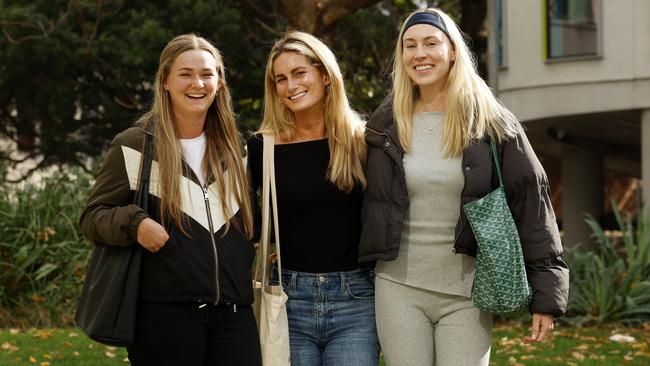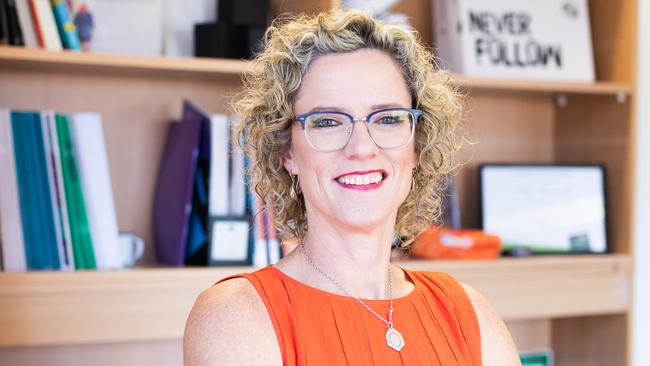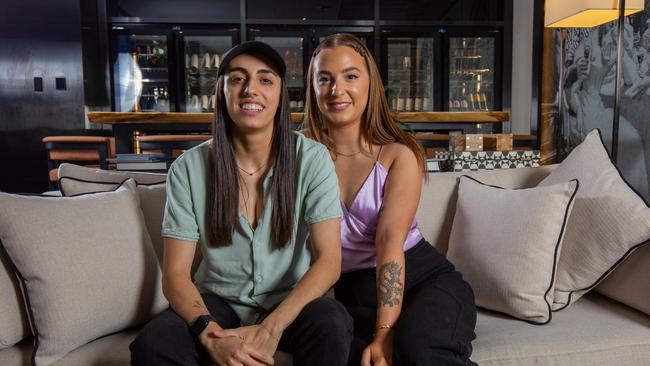‘Right to track’ partners: Young Aussies’ staggering response to this question
Almost a third of young people believe it’s normal to be jealous in a relationship, while more than half are still struggling to understand consent, new research has found. Watch the video.

NSW
Don't miss out on the headlines from NSW. Followed categories will be added to My News.
Exclusive: Almost a third of young people believe it’s normal to be jealous in a relationship, feeling they have a “right to know” where their partner is most of the time, new research has found.
The survey released on Tuesday, which interviewed 1000 people across Australia aged 14 to 20, revealed 54 per cent of teens and young adults are struggling to understand consent in relationships.
This includes them believing that “if a guy wants to have sex with a girl, it’s up to the girl to make it very clear she doesn’t want to”.
The latest findings, part of The Line’s ‘Comfort Zone’ campaign, from Our Watch, a national prevention of violence against women organisation, also found 49 per cent of young men aged 14-17 are “unsure, or don’t know what makes a relationship healthy”.

The initiative is designed to empower young Australians to recognise controlling behaviours and communicate healthy boundaries through an interactive game that helps them explore what feels right in relationships of all kinds — with friends, partners, family, and more.
Concerningly, only 22 per cent of young people surveyed felt completely confident to take action when they are uncomfortable, feel unsafe or disrespected in a relationship – signalling a greater need for support.
A third of young people believed they had a “right to know” where their partner is most of the time, which could include asking them to share their location.
Almost a third of respondents also thought it was OK to “be jealous” because it means they care about their partner.
More than a quarter of young people confuse controlling behaviours as signs of healthy boundaries, with 27 per cent believing being told they could not walk away from an argument was a healthy boundary and 29 per cent feeling that forcing physical touch out of love was a healthy boundary.
The initiative is backed by Heartbreak High stars Bryn Chapman Parish (Spider) and Sherry-Lee Watson (Missy) and TikTok content creators Taz and Alessia.
Chapman Parish said learning about the importance of boundaries had been “essential” in navigating his own personal relationships and interactions.
“It’s been great to be a part of this (campaign) because I wish someone had taken the time to teach me at a younger age how to protect my boundaries, values and use them in an effective way,” he said.

Our Watch chief executive Patty Kinnersly said most young people wanted to do the right thing, but they needed the proper tools and support.
“Healthy relationships start with healthy boundaries. By helping young people know what’s OK and not OK, they can navigate relationships knowing where their ‘comfort zone’ is and what to do if something doesn’t feel right for them,” Ms Kinnersly said.
“We know the online environment is having an impact on young people and their attitudes … so it’s important we’re giving young people the tools they need when they’re forming or developing their understanding of gendered roles.”
University students Veronica Star, Madeline Scott and Sarah Conway said young people were navigating a backdrop of “very grey lines” when it came to understanding the boundaries and dynamics that contributed to healthy relationships.
Ms Star said jealousy could become excessive, but “it’s kind of fun to know that your partner’s so into you,” as long as lines were not crossed.
For the three friends, sharing their location was second nature, and more a matter of safety.
“I feel good about sharing my location with a partner, but it can become problematic,” Ms Scott admitted.
“I’ve definitely been in situations where I’ve tracked my own partner’s location and tracked them step by step. In hindsight, I think that was more of a personal issue.”

Renewed Hope Counselling Services relationship and adolescent clinical counsellor Kerry Kostinsky Verlingieri said she had seen an increase in young people requesting “location sharing” in relationships.
“There is a way to see where your partner is at all times with new technology and this can be a pattern of coercive control when they feel forced to share their location,” Ms Kostinsky Verlingieri said.
Ms Kostinsky Verlingieri said jealousy in relationships was a normal emotion to experience, but warned it could become “harmful” when it was used to justify control.
Professor Michael Flood, researcher on men, masculinities and gender at the Queensland University of Technology, said there was still a “long way to go” in terms of young people and the wider community understanding consent.

“Often people assume that being in a relationship or marriage effectively guarantees consent in the future, we’re a long way from affirmative consent – the idea that people need to agree to every sexual act,” Prof Flood said.
An eSafety spokesman said the Our Watch research further underscored the need to help young people understand and set strong digital boundaries.
“eSafety recently issued an Online Safety Advisory warning that some young people are blurring the lines between digital care and digital control in their relationships,” he said.
New eSafety research also found that nearly one in five young adults thought it was acceptable to track their partner whenever they wanted, and almost one in four said it was reasonable to expect a partner’s passwords or device access.
“These attitudes reflect a troubling normalisation of tech-based coercive control, which is often misinterpreted as affection or care.
“If young people experience serious harms online, including image-based abuse, doxing, cyberbullying or stalking, they can report directly to us at esafety.gov.au/report.”
If you or someone you know is experiencing, or at risk of experiencing, domestic, family or sexual violence, call 1800RESPECT on 1800 737 732, chat online via www.1800RESPECT.org.au, or text 0458 737 732.
— Do you have a story for The Daily Telegraph? Message 0481 056 618 or email tips@dailytelegraph.com.au
More Coverage
Originally published as ‘Right to track’ partners: Young Aussies’ staggering response to this question




